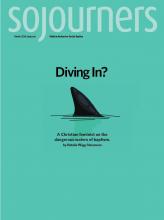Jesus replied, “Very truly I tell you, no one can see the reign of God unless they are born again.” “How can someone be born when they are old?” Nicodemus asked. “Surely they cannot enter a second time into their mother’s womb to be born!” Jesus answered, “Very truly I tell you, no one can enter the reign of God unless they are born of water and the Spirit. Flesh gives birth to flesh, but the Spirit gives birth to spirit.”
—John 3:3-6
IN THE WEEKS LEADING UP to my child’s baptism, I wrestled with this passage from the gospel of John. While it doesn’t explicitly mention baptism, most of the churches where I had worshipped over my years as a Christian nevertheless drew significantly on it when they articulated their understanding of what it is we’re doing in the waters. And so, experiencing a deeply conflicted desire to raise my child—my daughter—in the church, I prayed for God’s Spirit to release fresh insight from old wisdom. I was yearning to understand what it was we were about to do.
Nicodemus is almost always presented as a fool in this story. What a silly question! What a silly man, thinking that there might be any kind of a special relationship between a person’s first birth and their second! I’ve never heard a sermon or attended a Bible study where we acknowledge that for someone hearing this brand new and seemingly nonsensical concept of being born again, Nicodemus’ question is perhaps the most logical one to pose.
Even more to the point, I’d never noticed before that Jesus’ answer to the question doesn’t dismiss the validity of a mother’s labor as the very context out of which we should understand what it is that happens in baptism.
It’s patriarchal theology that did that.
Now, the phrase “patriarchal theology” might be an offensive one simply to toss around. So let me just tip my hand: I’m a card-carrying feminist theologian, Baptist minister mama. From some angles I look like a jumble of contradictions, contradictions that I try to live with grace and glee.
But it’s not the fact that I’m a Baptist that gave me pause on the decision of baptizing my infant daughter in the Anglican church in Toronto where our ecumenical family happens to worship. Of course, as a Baptist minister I affirm the theology of baptism as an outward expression of an inward conversion, an expression that requires one be of a certain age to be able to proclaim it. But at the same time, my ecumenical sensibilities and general disposition of theological expansiveness mean that I simultaneously affirm a more Anglican theology of baptism—which sees God’s invitation to the community of faith as occurring through a grace that precedes our awareness of it. So, being a Baptist married to an Anglican, I didn’t really struggle with the idea of baptizing our daughter on account of her infancy.
Read the Full Article

